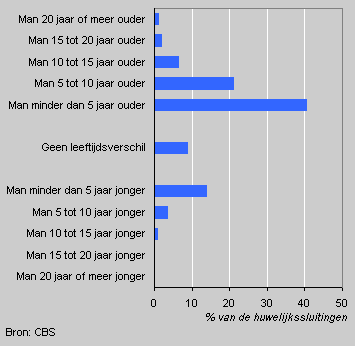Fewer fathers than mothers

On 1 January 2003 there were 3.7 million fathers and 4.5 million mothers in the Netherlands.
Few teenage fathers
Very few young men are fathers. On 1 January 2003 there were about 450 teenage fathers. There are about ten times as many teenage mothers. Fatherhood is also hardly ever an issue for men in their twenties.
Fathers and mothers by age, 1 January 2003

On average men become first time fathers when they are about thirty. The average age for women having their first child is slightly lower at 29. Compared to other countries this is a relatively late age.
Women select older partner
Motherhood at a late age, and fatherhood at an even later age usually go together. Partner selection plays a role in this. Women tend to marry an older partner. So it is true for every age that the number of men who are fathers is lower than the number of women who are mothers. This difference is especially clear among people in their twenties, thirties and forties.
Marriages by age difference, 2002

Older fathers
Men are physically capable of fathering children at a relatively advanced age. There are relatively many men over forty still have children. For women being over forty means that the natural phase in which they can become mothers is drawing to a close. Therefore the difference between the number of fathers and mothers slowly decreases among people in their forties.
Widowed mothers
At the age of sixty the difference between the number of fathers and mothers increases again. Mortality is a greater risk for men than for women at that age, so that the number of men declines more rapidly than the number of women. Correspondingly the number of fathers decreases faster than the number of mothers.
Jan Latten and Helma Schapendonk